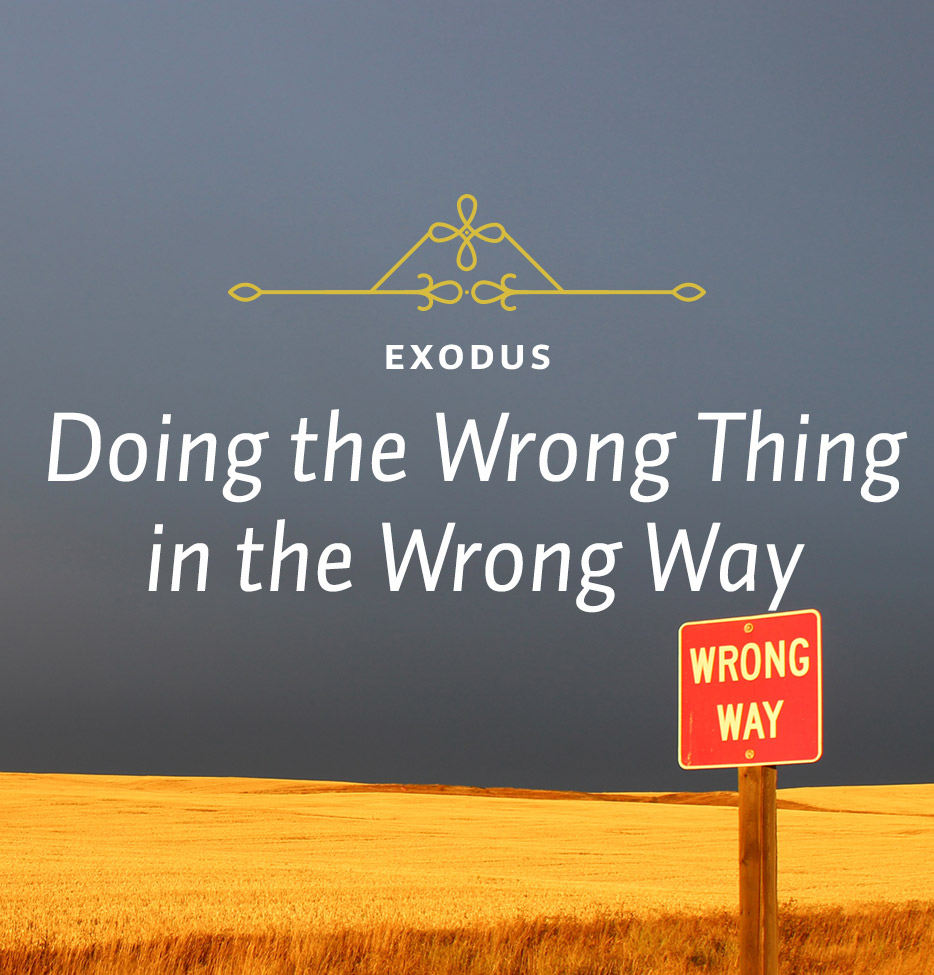A third application is that one failure does not necessarily disqualify us from future service. We are often destroyed by personal failure. The reason for that is that we have too high an opinion of ourselves to start with. We think we can’t fail, and so when we do fail we shut down, are embarrassed, or feel overwhelmed. What we want to do is pull down the blinds, hide in bed, and not come out for a year or two when people have forgotten who we are and perhaps we have forgotten as well.
Are you demoralized because of some past failure? You can find yourself thinking, “God can’t use me anymore. I have failed Him.” Well, that’s what the devil would like you to think. And in case you don’t think of it, the devil will put those thoughts into your mind anyway. But listen, it is not true! And Moses is a great example to the contrary. He certainly failed, but it didn’t mean that God couldn’t use him. God came again and he used him greatly. God knows you. He knows you’re only dust. He made you. He’s not surprised that there is failure in you. He knows what you are like. But He also knows what He is able to do through you by Jesus Christ, and that makes the difference.
The fourth application is what I will call the blessing of solitude. Moses was inactive for these forty years, alone with his thoughts in the Midian wilderness. What was accomplished during those forty years? Moses grew deep in himself, and he grew in his knowledge of God. He settled down.
Have you been set in a solitary place temporarily? Are you inactive, unable to work, unable to contribute much? Sometimes people are laid up because of sickness. They can’t work. That is not necessarily bad. If that’s something that God has brought into your life, receive it from Him. Use it to study, think, meditate, and pray. Paul spent three years in Arabia after his conversion before God pulled him and began to do anything with him. And those were important years in the life of Paul.
Here is the fifth area of application. God was active, even when Moses was not. You see when you and I are laid up and are unable to do anything, we say, “Well it’s all over. Nothing is happening.” We may not be doing anything, but God is doing something. God is never inactive. God is constantly at work, and here we find at the very end of Exodus 2 that He is hearing His people. He is concerned about them. And what he is doing, although Moses doesn’t know it, is preparing Moses to be the deliverer. Maybe God is using your solitude to prepare you for some important work He has for you to do.
When we look at this story, and when we study it in the light of the Bible, we discover that God remembers our faith, not our failures. The reason I say that is because when you go to Hebrews 11, you find that Moses is praised for his faith there three times. Most of those characters are praised for their faith once. We are given four examples of faith for Abraham, and three items for Moses. Not once is his sin of murdering the Egyptian even mentioned.
The first thing for which Moses is praised is for identifying with his own oppressed people rather than the Egyptians. “By faith Moses, when had grown up, refused to be known as the son of Pharaoh’s daughter. He chose to be mistreated along with the people of God rather than to enjoy the pleasures of sin for a short time.” Secondly, he’s praised for leaving Egypt: “By faith he left Egypt, not fearing the king’s anger; he persevered because he saw him who is invisible.” I suppose when we read that we think of that as a description of the exodus. But what you find next is the observance of the Passover and I would suggest that this second praising of Moses for his faith has to do with his first departure from Egypt rather than the last. In other words, it’s referring to his leaving the palace, identifying with his people. But you see, it doesn’t mention the Egyptian. And then the third time he is praised for having kept the Passover. “By faith he kept the Passover and the sprinkling of blood so that the destroyer of the first born would not touch the first born of Israel.”
In his great summary of Moses’ life and his faith achievements, the things that are written down in heaven and now also written down in Hebrews for our benefit, not once is his failure even mentioned. And that’s the way God is with us. He doesn’t remember your failures. You may remember them, but it’s a sin even to bring them up. You have to forget about them. God said of Israel, “I will forgive their wickedness and I will remember their sins no more.” Isaiah said, “You have put all my sins behind your back.” Your failures as well as your sins have been forgiven because of the work of Jesus Christ. And the real question is, do you believe it? If you don’t believe it, you will keep digging them up and it won’t do any good. If you do believe it, then you won’t let some past sin destroy your faithfulness and your ability to serve God now.






